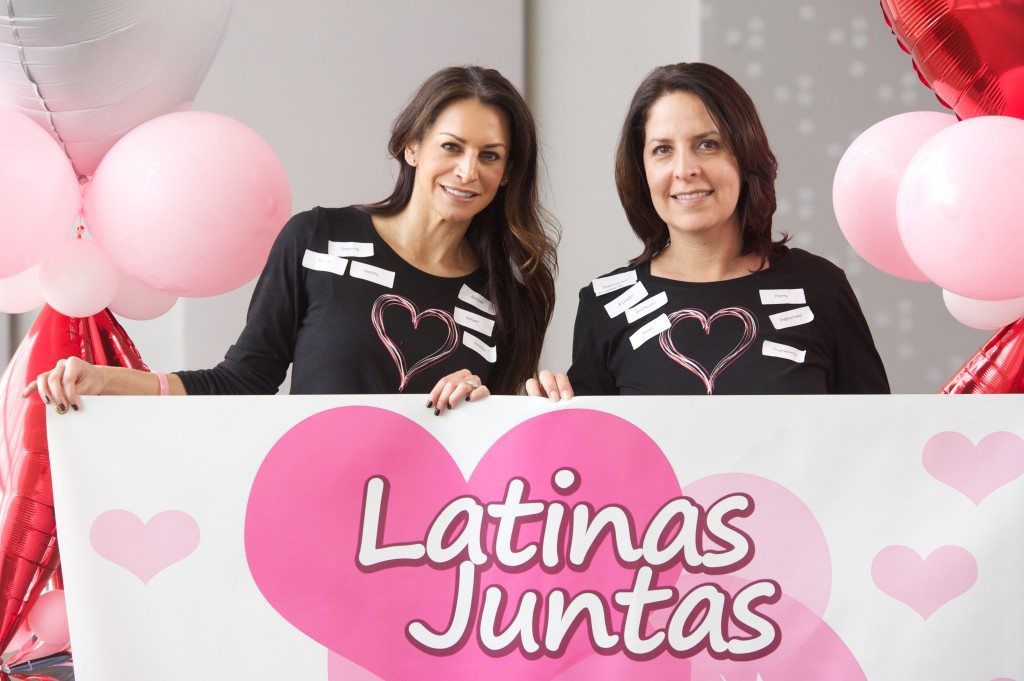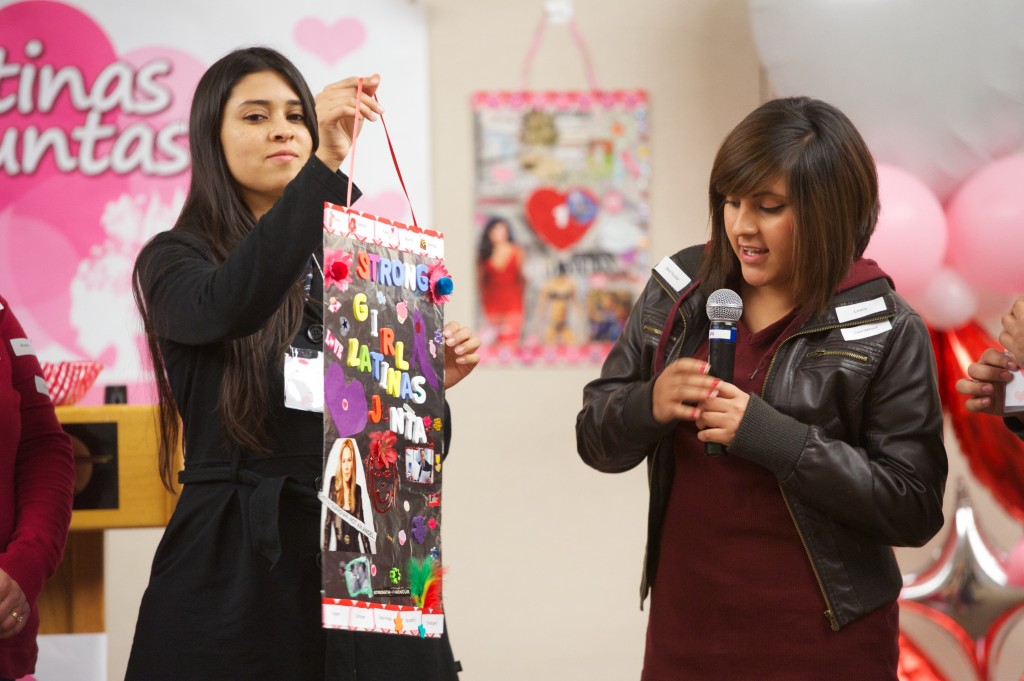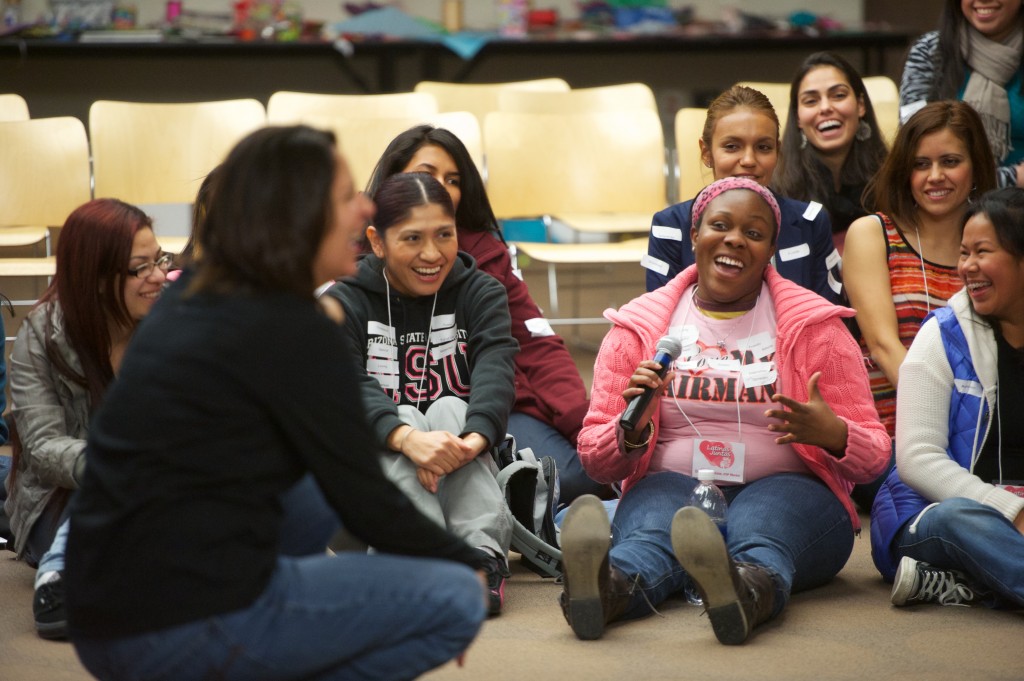
Whether you attend or just peek in on Latinas Juntas (Latinas Together) at California State University, Dominguez Hills, it’s easy to see that the event fosters instant, deep, and lasting camaraderie among the students, alumni, faculty, and staff, no matter if they are returnees or first-time participants to the event, now in its 10th year. Its co-founders Denna Sanchez, a clinical psychologist for the Career Center, and Monica Rosas-Baines, a clinical psychologist for Student Health and Psychological Services, not only lead the way to empowerment and sisterhood, they embody it.
The two–who, Sanchez said, “finish each other’s sentences”–met on campus in 2002 and instantly bonded, drawing strength from one another. They also recognized that they could do more to serve Latinas at the university, especially those who are first-generation college students.
“In our clinical work, we noticed that we would hear the same themes come up in our therapy sessions with Latina students. We know that not every student will seek out therapy so we wanted to create a forum where we could talk about these issues together. We know many students feel like they are the only ones dealing with these stressors, when in reality, many of our students are dealing with the same pressures.” Rosas-Baines said.
Rosas-Baines’ aunt Pat Mora, an author and literacy advocate who has helped to fund the Latinas Juntas and whose poetry has been recited at the event since its inception in 2003, delivered the keynote speech to this year’s workshop, which took place on Friday, Feb. 8, and focused on overcoming fear, and self-investment through reading and education. Through other bonding and empowering activities, participants learned about each other and in doing so, discovered they are not alone in their circumstances.
Rosas Baines described some of those issues as related to cultural pressure, family, insecurities, and anxieties.
“So, we try to focus on things that bring Latinas students, faculty, and staff together to create a sense of community, sisterhood, support, and trust,” she said.
Sanchez said of the event, which has hosted more than 800 participants over the past 10 years, “Our activities have grown and they’re more intuitive. But, the issues that our students face are the same as 10 years ago.”
Rosas-Baines added that research shows that students of color are more likely to succeed if they feel connected to the campus, asserting, “[Latinas Juntas] is one method of that. So, it’s really a retention effort.”
And seeing what event veterans have accomplished, it’s clear the efforts are successful.
Alumna Adriana Noriega (Class of ’08, B.A. biology), struggled while a student at the university, but found help through Latinas Juntas, which she has attended annually since it began.
“I love it. Latinas Juntas helped me. For a few years I lost my way, career wise, but the participating in the program helped find my way,” said Noreiga, who since has become the “cookie artist” in her home-bakery business, Precious Pastries, that takes orders through its Facebook page and ships nationwide, and whose Latinas Juntas-themed cookie centerpieces adorned the event luncheon tables.

For others, returning to Latinas Juntas is a longer journey.
Alumna Maricelia Carmona (Class of ’04, B.A., Chicano/a studies/Spanish language and literature), who is in the single-subject teaching credential program at CSU Dominguez Hills, returned for the first time this year since attending in 2006.
“I was coming here to school and I saw the signs [for the event]. It brought back memories of how great it was the first time I was here 10 years ago,” Carmona said. “In 2003 I was struggling to graduate–I have kids. It was really hard. I made the time to come to this event 10 years ago and it gave me strength.”
Carmona added that since she had the time and is currently going through a new set of challenges, she again wanted to experience the warm and understanding environment Latinas Juntas provides.
“It’s very welcoming, the same as 10 years ago. It hasn’t changed. It’s gotten better,” she said.
For alumna Monica Lomeli (Class of ’07, B.A., anthropology/behavioral science) attending college had other pressures. Needing to stay close to home so she could work and help support her family financially, she chose CSU Dominguez Hills. But by her second year, lonely and feeling isolated, she explored the option of transferring to another university.

“In addition to being kind of shy and introverted, I never sought any friendships, professors or any kind of engagement on campus, until I went to Latinas Juntas in my sophomore year,” she said. “That really convinced me to stay at Dominguez.”
Lomeli went on to become a McNair scholar and was mentored by Sanchez and Rosas-Baines on her senior thesis project, “Latinas Self-efficacy,” which explored how Latinas could apply to and succeed in graduate school, which she is doing now at University of California, Santa Barbara.
“I’m a product of their reinforcement of how Latinas struggle, not just academically, but with all these other hardships that there are hardly forums for women to discuss. Especially when you consider the gender challenges in the Latino culture–that we’re not supposed to go to school, that we’re not supposed to be educated. There’s a lot of things that we’re not supposed to be, but Latinas Juntas helps us discover that we are supposed to be all these things,” Lomeli said.
Others are compelled to serve their Latinas sisters.
Alumna Marcela Hernandez (Class of ’01, B.A., communications; ’05, M.A., educational counseling), who is a counselor at West Los Angeles College, said she began volunteering for the event after attending a group session led by Sanchez and Rosas-Baines in the career development in the early 2000s.
“I saw how supportive they were of the students and I realized they already had this program going on. …It was not available when I was an undergraduate student” she said. “Juntas is really the key word. Coming to this event as a freshman is crucial.”
Katy Pinto, assistant professor of sociology, said participating as a facilitator for Latinas Juntas has allowed her to be more empathic as a professor.
“The challenges that some of our students face, they’re problems that I had when I was a student. It takes me back to when I was a student and makes me think that we still have work to do,” she said.
And as a group, many women do it together–Latinas Juntas.
For more information on the Latinas Juntas program, visit www.csudh.edu/latinasjuntas.